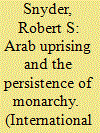| Srl | Item |
| 1 |
ID:
141282


|
|
|
|
|
| Summary/Abstract |
The Arab uprising that began in 2010 saw the fall of rulers in states that had republican governments, yet the monarchs in their states survived. This is ironic in light of the fact that many monarchs throughout history have been vulnerable to revolutions. What explains this discrepancy? Although the literature has emphasized the impact of petrodollars in preserving the rule of the monarchs, this article stresses ideological and institutional factors. Like the Soviet Union's embrace of Marxism–Leninism, the Arab republics had regimes based on the failed ideology of revolutionary nationalism. Although revolutionary nationalism, which fused the nation and state, declined by the late 1960s, it left an institutional legacy that made it difficult for the republican states to change. On the contrary, in defining themselves in opposition to revolutionary nationalism, the monarchs provided for security and stability in making themselves somewhat immune to transnational revolutionary movements like the Arab uprising. In differentiating the state from the nation, the monarchs, paradoxically, showed more respect for different societal interests within the nation than the republican rulers.
|
|
|
|
|
|
|
|
|
|
|
|
|
|
|
|
| 2 |
ID:
147200


|
|
|
|
|
| Summary/Abstract |
The first generation of radical nationalists in British India played a crucial role in the emergence of political propaganda as a fully fledged industry in the era after the partition of Bengal in 1905. Bal Gangadhar Tilak's 1897 trial is a key moment in this story: it marks the first time that dissent was criminalised, and that reading publics across British India were confronted with powerful arguments theorising political violence. This paper attempts to draw out the meanings Tilak made in two of his texts (an article and a poem, both published in Kesari) and the two most influential readings to which they were subject at the time: one in the courtroom, where the texts were successfully assimilated to the narrowest possible legal interpretation, resulting in Tilak's conviction, and the other in the Indian press, where the drama of the trial eclipsed the texts themselves. The trial moderated the militant message of the texts for the middle-class print public and allowed for a more acceptable definition of radicalism to emerge, one anchored in themes of suffering, sacrifice and victimisation.
|
|
|
|
|
|
|
|
|
|
|
|
|
|
|
|